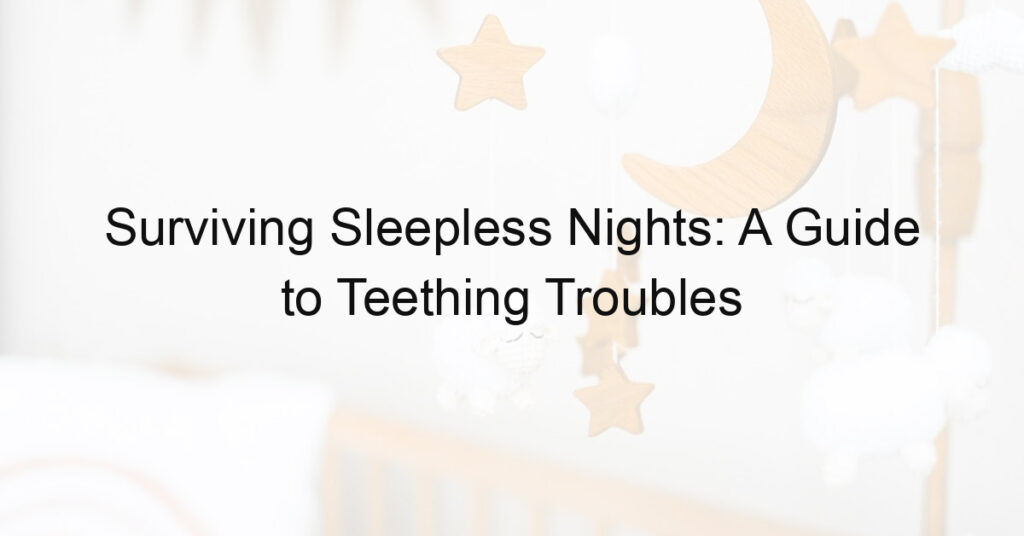
Understanding Teething Baby Sleep Problems
Teething is a natural part of a baby’s development, but it can cause some challenges, especially when it comes to sleep. In this section, we’ll explore what teething is, how it affects your baby’s sleep, and how to recognize teething sleep issues.
- What is teething?
- How teething affects baby’s sleep
- Recognizing teething sleep issues
Teething is the process by which a baby’s first teeth, also known as primary teeth or baby teeth, begin to erupt or break through the gums. This usually starts around six months of age, but it can happen earlier or later. Every baby is different. The process can cause discomfort and make your baby more irritable, which can affect their sleep.
When a baby is teething, they may have trouble falling asleep, wake up more frequently, or have shorter sleep durations. The discomfort caused by the erupting tooth can make it hard for them to settle down and sleep. They may also wake up due to the pain. According to a study, about 60% of parents report sleep disturbances in their babies during the teething period.
Recognizing teething sleep issues can be tricky as babies can’t tell us what’s wrong. However, there are some signs to look out for. If your baby is waking up more often than usual, seems unusually fussy, has swollen or red gums, or is chewing on things more than usual, they might be teething. Remember, every baby is different, and these signs can vary.
In the next sections, we will delve deeper into navigating these challenges, what to expect during this period, and practical tips to manage sleep when your baby is teething. Stay tuned!
Navigating Teething Challenges
Teething can be a challenging time for both babies and parents. It’s a natural process, but it can cause discomfort and disrupt daily routines. Understanding the symptoms of teething can help you better navigate this period and provide the necessary comfort for your little one.
Identifying Teething Symptoms
Teething symptoms can vary from one baby to another. However, there are some common signs that you can look out for. These include:
- Increased drooling: This is often the first sign of teething. You might notice your baby’s clothes are more damp than usual. It’s because their body is preparing for the teeth to break through the gums.
- Fussiness and irritability: As the teeth push through the gums, it can cause discomfort. This may make your baby more irritable or fussy than usual. They may also seem less interested in food or play.
- Disturbed sleep patterns: The discomfort caused by teething can disrupt your baby’s sleep. They may wake up more often during the night or have difficulty falling asleep.
Remember, these symptoms can also be signs of other health issues. If your baby’s symptoms persist or if they seem particularly distressed, it’s always a good idea to consult with a healthcare professional.
Managing Sleep Disruption Due to Teething
Teething can be a challenging time for both parents and babies, especially when it disrupts sleep. However, there are several strategies you can employ to manage this disruption and ensure your baby gets the rest they need. Here are three key strategies:
- Establishing a Soothing Bedtime Routine
- Using Teething Toys and Gels
- Comforting Your Baby Through the Night
Establishing a calming bedtime routine can help your baby relax and sleep better, even while teething. This routine could include a warm bath, a gentle massage, or reading a bedtime story. Consistency is key, so try to follow the same routine every night. This helps signal to your baby that it’s time to sleep.
Teething toys and gels can provide relief for a teething baby and help them sleep better. Teething toys are designed to be chewed on, providing a soothing pressure to the gums. Teething gels, on the other hand, can numb the gums temporarily and reduce discomfort. However, always consult your pediatrician before using any teething gels.
Teething can cause discomfort that may wake your baby up during the night. When this happens, try to comfort your baby by holding them, singing a lullaby, or rocking them gently. Remember, your presence can be very comforting to a teething baby.
Teething is a natural part of a baby’s development, and while it can disrupt sleep, remember that this phase won’t last forever. With patience, consistency, and the right strategies, you can help your baby navigate this challenging time and ensure they get the rest they need.
Baby Sleep During Teething: What to Expect
When your baby starts teething, it can be a challenging time for both you and your little one. One of the most significant changes you may notice during this period is in your baby’s sleep patterns. Here’s what you can expect:
- Changes in Sleep Patterns
- Increased Night Awakenings
- Shortened Nap Times
Teething can cause a shift in your baby’s sleep patterns. You may notice that your baby, who used to sleep soundly, is now having difficulty settling down for naps or bedtime. This is because the discomfort from teething can make it hard for them to relax and fall asleep.
Another common symptom of teething is increased night awakenings. The pain and discomfort can cause your baby to wake up more frequently throughout the night. This can lead to a significant disruption in their sleep schedule, as well as yours.
Teething can also result in shortened nap times. Your baby may wake up from their naps earlier than usual due to the discomfort. This can lead to a decrease in the total amount of sleep they get each day, which can affect their mood and overall health.
Understanding these changes can help you better support your baby during this challenging time. Remember, every baby is different, and these changes may not occur in every teething baby. However, being aware of these potential changes can help you prepare and manage your baby’s sleep during teething more effectively.
Teething and Sleep Patterns: A Case Study
Let’s delve into a real-life scenario that illustrates the struggles and solutions associated with teething and sleep patterns. This case study will provide a comprehensive view of the challenges faced, the strategies implemented, and the results achieved.
- Background of the case
- Challenges faced
- Solutions implemented
- Results and key takeaways
Our case study revolves around a 6-month-old baby named Lily. Lily was a good sleeper until she began teething. Her parents noticed a significant change in her sleep patterns, with Lily waking up frequently at night and having difficulty settling back to sleep.
The primary challenge was the disruption of Lily’s sleep patterns due to teething discomfort. This led to sleep deprivation for both Lily and her parents. Lily became irritable during the day, and her parents struggled with fatigue, making it difficult for them to manage their daily responsibilities effectively.
Lily’s parents consulted a pediatrician who suggested a few strategies to manage Lily’s teething discomfort and improve her sleep. They introduced a safe teething toy for Lily to chew on during the day, which helped to alleviate some of her discomfort. They also established a consistent bedtime routine to signal to Lily that it was time to sleep. This routine included a warm bath, a gentle massage, and a quiet story or lullaby before bed.
After implementing these strategies, Lily’s sleep patterns began to improve. While she still woke up occasionally, she was able to self-soothe and fall back to sleep more easily. Her parents also reported feeling more rested and better able to manage their daily tasks. The key takeaway from this case study is the importance of a consistent bedtime routine and the use of safe teething aids to manage teething discomfort and improve sleep.
In conclusion, teething can significantly disrupt a baby’s sleep patterns, but with the right strategies in place, it is possible to manage this challenging phase effectively. Remember, every baby is unique, and what works for one may not work for another. It’s essential to consult with a healthcare professional to find the best solutions for your baby’s specific needs.
Managing Sleep When Baby is Teething: Practical Tips
Teething can be a challenging time for both babies and parents. It can disrupt sleep patterns and cause discomfort. However, there are several practical tips that can help manage your baby’s sleep during this period.
Teething Sleep Solutions
Here are some effective solutions to help your teething baby sleep better:
- Creating a calming sleep environment: A peaceful and comfortable environment can significantly improve your baby’s sleep. Use soft lighting, play soothing music, and ensure the room temperature is comfortable. A consistent bedtime routine can also help signal to your baby that it’s time to sleep.
- Using pain relief methods: Over-the-counter teething gels or pain relievers can help soothe your baby’s discomfort. Always follow the instructions on the packaging and consult your pediatrician if you have any concerns. A cold teething ring can also provide relief.
- Seeking professional advice: If your baby’s sleep continues to be disrupted, it may be worth seeking advice from a healthcare professional. They can provide tailored advice and may suggest other treatments or strategies to help manage your baby’s teething symptoms and improve their sleep.
Remember, every baby is unique and what works for one might not work for another. It’s important to be patient and try different strategies until you find what works best for your baby.
Overcoming Teething Sleep Challenges
Teething can be a challenging time for both parents and babies. It can disrupt sleep patterns and cause discomfort for your little one. Here are some practical tips to help you overcome these challenges:
- Staying patient and understanding
- Trying different soothing techniques
- Keeping a sleep diary
Patience is key during this phase. Your baby is going through a lot of discomfort and it’s important to understand that this is a normal part of their development. It’s not easy to see your little one in pain, but remember that this phase will pass. Try to stay calm and comforting, your baby needs your support during this time.
Every baby is different and what works for one might not work for another. Try different soothing techniques to see what works best for your baby. This could include using a teething ring, giving them a cold washcloth to chew on, or gently massaging their gums. You could also try changing their sleeping position or introducing a comforting bedtime routine to help them sleep better.
Keeping a sleep diary can be a helpful tool in understanding your baby’s sleep patterns during teething. Note down when your baby sleeps and wakes up, how long they sleep for, and any changes in their behavior. This can help you identify any patterns or triggers and make necessary adjustments to their sleep routine. It can also be a useful reference for your pediatrician if you need to seek professional advice.
Remember, every baby is unique and what works for one might not work for another. It’s all about finding what works best for your baby and being patient during this challenging time. With a little patience and understanding, you and your baby can overcome the sleep challenges associated with teething.
Sleep Strategies for Teething Babies
Teething can be a challenging time for both babies and parents. The discomfort can disrupt sleep patterns, leading to restless nights. However, there are strategies that can help manage this period and ensure your baby gets the sleep they need. Here are three key strategies:
- Adjusting Sleep Schedules
- Introducing Sleep Aids
- Ensuring Baby is Well-Fed Before Bedtime
During teething, your baby’s sleep schedule may need some adjustments. It’s important to be flexible and responsive to their needs. You might find that your baby needs more frequent but shorter naps during the day, or that they need to go to bed earlier in the evening. Remember, every baby is different, so what works for one might not work for another. It’s all about finding what works best for your baby during this time.
Sleep aids can be a helpful tool during teething. This could be a special blanket, a soft toy, or a pacifier. These items can provide comfort and help soothe your baby to sleep. However, it’s important to introduce these aids gradually and ensure they are safe for your baby to use. Always supervise your baby when they are using a sleep aid, especially if it’s a new item.
A well-fed baby is more likely to sleep soundly. Try to ensure your baby has a good feed before bedtime. This can help them feel satisfied and sleepy. However, be aware that teething can sometimes cause a decrease in appetite. If this is the case, try offering smaller, more frequent feeds throughout the day to make sure your baby is getting enough nutrition.
In conclusion, teething can be a challenging time, but with patience and the right strategies, you can help your baby navigate this stage and ensure they get the sleep they need. Remember, every baby is unique, so it’s important to find what works best for your little one.
Conclusion: Surviving Sleepless Nights During Teething
As we conclude this comprehensive guide on surviving sleepless nights during teething, let’s revisit the key points we’ve discussed, provide some encouragement for parents, and share additional resources.
- Recap of key points:
We’ve learned that teething can disrupt a baby’s sleep patterns, leading to sleepless nights for both the baby and the parents. We’ve also explored a case study that illustrates the impact of teething on sleep patterns. Practical tips and strategies have been shared to help manage sleep when your baby is teething. These include maintaining a consistent bedtime routine, using teething toys, and consulting with a pediatrician if necessary.
- Encouragement for parents:
Remember, you’re not alone in this journey. Many parents have been through the same sleepless nights and survived. It’s a challenging phase, but it’s also temporary. Your baby will eventually outgrow this phase, and normal sleep patterns will resume. Stay patient, stay strong, and know that you’re doing a great job.
- Additional resources:
For further reading, consider books on baby sleep patterns and teething, or consult online parenting forums for advice and support from other parents going through the same experience. You can also reach out to your pediatrician or a child sleep consultant for professional guidance.
In the end, remember that every baby is unique and what works for one might not work for another. It’s all about finding what works best for your baby and you. With patience, love, and the right strategies, you’ll be able to navigate this challenging phase successfully.














